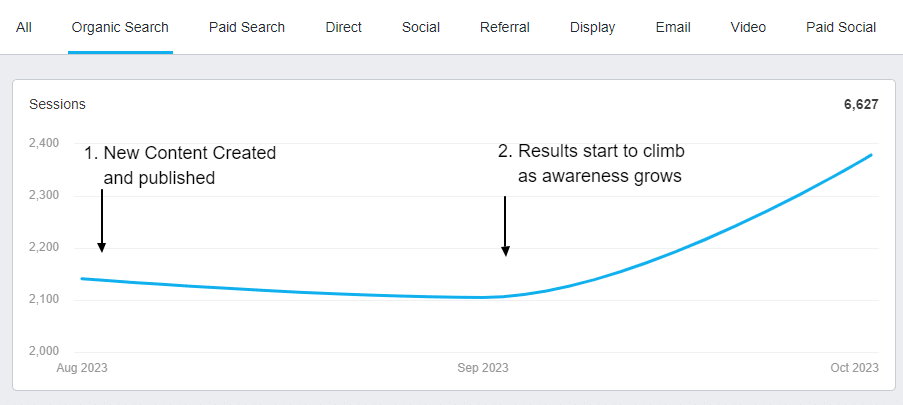Introduction: Understanding Business Blogging
Even in the age of AI-generated text and automation, business blogging continues to work as an indispensable marketing tactic that enhances online business visibility. Unlike traditional marketing channels, a business blog offers a unique platform for companies to engage with their audience, offering insights, information, and solutions directly related to their products or services.
At its core, business blogging isn’t just about content creation; it’s an integral part of a broader digital marketing strategy. It intertwines with other elements like social media, email marketing, and direct mail, contributing significantly to business growth. This multifaceted tool goes beyond mere promotion, allowing businesses to establish a rapport with their audience, provide value through information, and position themselves as thought leaders in their respective industries.
The essence of business blogging lies in its ability to attract and retain customer interest. In an age where consumer attention is a coveted resource, a well-curated blog can distinguish between a business that merely exists online and one that thrives. By consistently delivering relevant and engaging content, companies can draw in potential customers, retain existing ones, and build a loyal community around their brand.
The seven sections which follow all relate to a core concept: People will always require some information before purchasing a product or service. The information they see first, that they really like, and pulls them further through the marketing funnel – wins.
It would be best if you first produced a piece of content that, through research, has the highest probability of converting the prospect.
Then, increase its visibility by formatting the content in a way your audience prefers on a marketing channel(s) that they frequent the most regularly so they see yours before the competition.
At this stage, you can analyse the results and optimise accordingly.
Now, let’s look at content marketing’s importance in more detail.
1. Driving Website Traffic
One of the most tangible benefits of business blogging is its proficiency in driving traffic to a company’s website. In the quest for increased website visitors, businesses often need help resolving a common problem: “How do I reach new audiences while retaining the existing customers?“. Blogging offers a solution by serving as a dynamic and organic method to attract new traffic.
The process is straightforward yet powerful. Each blog post acts as an additional indexed page on the website, increasing the chances of appearing on search engine results pages (SERPs). This, in turn, enhances the website’s visibility in organic searches. The key here is consistency and relevance. The more frequently a business updates its blog with high-quality posts, the more opportunities it creates to be discovered by new audiences.
But it’s not just about quantity. The quality of the content plays a crucial role. Engaging, informative, and well-written blog posts are more likely to attract readers and encourage them to explore the website further. This not only increases immediate traffic but also aids in building a returning audience, which is essential for sustained online growth.
2. Enhancing Social Media Presence
In the interconnected world of digital marketing, a solid social media presence is crucial for businesses. Blogging enhances a company’s social media efforts. Each blog post provides fresh content to share across social networks like Twitter, LinkedIn, Facebook, and Pinterest. This diversifies the content on these platforms and exposes the business to new audiences who may have yet to be reachable through traditional marketing methods.
Moreover, blog content can significantly ease the burden of content creation for social media. Instead of constantly brainstorming new content, social media managers can repurpose blog posts, breaking them down into smaller, more digestible pieces suitable for social media feeds. This approach ensures a steady stream of relevant content, keeping the business’s social media profiles active and engaging.
The relationship between blogging and social media is indeed symbiotic. While the blog content bolsters social media efforts, the social media channels, in return, drive new visitors to the blog. This creates a cycle of mutual growth, enhancing the overall digital presence of the business.
3. Converting Traffic into Leads
Once a business successfully drives traffic to its website through blogging, the next crucial step is converting this traffic into leads. At this stage, the strategic placement of calls-to-action (CTAs) in blog content becomes vital. Every blog post represents a new opportunity to generate leads.
A typical conversion path begins with a visitor landing on the blog and encountering a CTA for a free offer – an ebook, a whitepaper, a webinar, or a trial. The visitor then clicks the CTA, lands on a page containing a form, fills in their details, and receives the offer. This simple yet effective mechanism turns a casual reader into a potential lead, ready for further engagement.
The key to successful lead conversion in blogging lies in the relevance and value of the offers. Businesses must ensure that the blog’s content aligns with their target audience’s interests and that the proposals are compelling enough to encourage information trade. For instance, a blog post about digital marketing trends could have a CTA for a free guide on the latest digital marketing strategies. Such targeted offers increase the likelihood of conversion and help build a qualified leads database for the sales team.
4. Establishing Industry Authority
Blogging is a powerful tool for businesses to establish themselves as authorities in their respective fields. Companies can position themselves as knowledgeable and reliable sources in their industry by consistently creating and publishing valuable content that addresses their target audience’s common questions and concerns.
This aspect of blogging goes beyond just providing information. It’s about building trust with the audience. When customers find answers to their questions and solutions to their problems through a business’s blog, they begin to view the business as a service provider and an expert in the field. This perception is invaluable for long-term customer relationships and brand loyalty.
Furthermore, establishing authority through blogging can significantly impact sales and customer service. Sales teams can leverage educational blog content to inform leads and close deals better. Customer service teams can use blog posts as resources to assist and educate customers. All this streamlines the process and enhances the overall customer experience.
5. Aiding in Link Building and SEO
With a focus on search engine optimisation (SEO), link building is a critical factor. Blogging significantly contributes to this by attracting inbound links from other reputable websites. These links are crucial as they act as endorsements for your site, signalling to search engines like Google that your content is valuable and trustworthy.
The challenge for many businesses is to create content that is valuable to their customers and other industry leaders. When a blog post is informative, well-researched, and insightful, it increases the likelihood of receiving inbound links from authoritative sources. These links then contribute to the overall domain authority of the business’s website, improving its ranking in search results.
Another SEO benefit of blogging is constantly adding fresh, relevant content to the website. Search engines favour websites that regularly update their content. By maintaining an active blog, businesses signal to search engines that their website is alive, relevant, and continually offering new information. The result not only helps in improving search rankings but also in maintaining them over time.
6. Generating Long-Term Results
The beauty of blogging lies in its ability to yield long-term results. Unlike traditional marketing efforts, which often require continuous investment for sustained visibility, a well-crafted blog post can continue to attract visitors and generate leads long after it’s published. This enduring benefit is one of the most compelling reasons businesses invest in blogging.
Once a blog post is indexed and ranks on search engines, it has the potential to attract visitors for months, even years, without any additional investment. This phenomenon is known as ‘compounding’, where older blog posts continue to drive traffic and leads over time.
It’s not uncommon for most of a blog’s traffic and lead generation to come from posts published in previous months or years. 3 to 6 months is the typical timeframe for content optimised for search engines – depending upon its level of authority.
This long-term impact extends to various aspects of a business’s digital presence. For instance, a blog post that gains traction can continue to be a source of social media shares, contributing to an ongoing cycle of exposure and engagement. Moreover, the cumulative effect of regularly publishing quality blog posts can significantly boost a website’s overall search engine rankings, further enhancing visibility and traffic.
7. Sharing Company News and Updates
Blogs offer an excellent platform for businesses to share news and updates. This aspect of blogging is vital for humanising a brand and building a connection with the audience. Whether announcing a new product, sharing insights from industry events, or celebrating company milestones, a blog allows businesses to communicate these updates more personally and engagingly.
Furthermore, sharing news and updates through a blog can supplement a business’s public relations strategy. It provides a direct channel to the audience, bypassing traditional media constraints and allowing for complete control over the message and tone. This direct communication can be particularly effective in building customer transparency and trust.
Additionally, company blogs can serve as a hub for thought leadership. By publishing insightful articles on industry trends, businesses can establish themselves as forward-thinking and innovative, enhancing the company’s reputation and attracting like-minded individuals and organisations, opening doors to new partnerships and opportunities.
Conclusion: The Crucial Role of Blogs in Business and Marketing
In summarising the importance of blogs for business and marketing, several key points stand out:
- Enhanced Online Visibility: Blogs significantly boost a business’s online presence, making it more visible and accessible to potential customers.
- Increased Website Traffic: Regular blogging drives organic traffic to a business’s website, leveraging search engine optimisation to attract new visitors.
- Social Media Synergy: Blog content can be shared and repurposed on social media platforms, enhancing a business’s social media strategy and reach.
- Lead Generation and Conversion: Blogs serve as an effective tool for converting visitors into leads through strategic calls-to-action and valuable content.
- Establishing Industry Authority: Through informative and insightful content, businesses can establish themselves as thought leaders and go-to sources in their industry.
- Support for SEO and Link Building: Blogging aids in improving a website’s SEO, attracting inbound links that boost search engine rankings and domain authority.
- Long-Term Benefits: Unlike many marketing strategies, blogging offers enduring results, with posts continuing to attract traffic and generate leads well after publication.
- Direct Communication Channel: Blogs provide a platform for businesses to share news, updates, and insights, fostering a direct and personal connection with the audience.
- Cost-Effectiveness: Unlike many other marketing methods, blogging offers a cost-effective way to reach and engage a target audience.
Blogging is not just a tool but an essential component of a comprehensive digital marketing strategy, directly affecting a business’s bottom line.
Incorporating a well-structured and consistently managed blog is indispensable for businesses aiming to thrive in the digital-first era.




